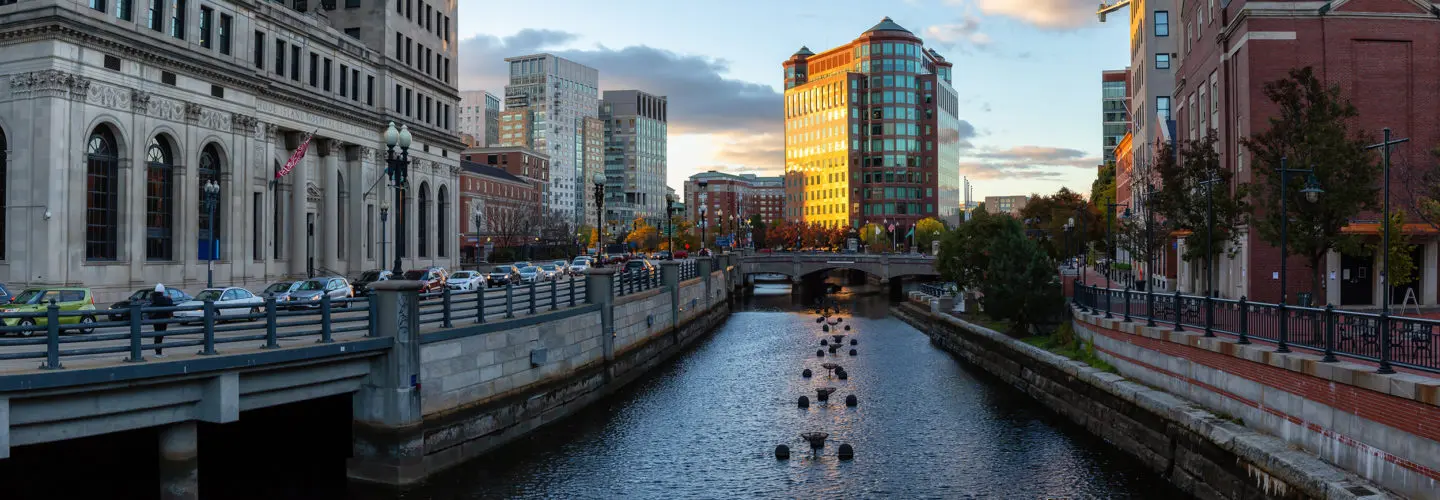A Clean Energy Future for Rhode Island
Acadia Center’s Goals in Rhode Island
Rhode Island offers a unique opportunity for clean energy action. With its small geographic size, high population density, and a single utility serving nearly all the state’s energy customers, Rhode Island is a model venue for the equitable, clean energy vision central to Acadia Center’s work. Known in history as the birthplace of the American industrial revolution, Rhode Island is poised, once again, to become a center for innovation and the birthplace of a clean energy revolution. Rhode Island is also particularly vulnerable to the worst effects of climate change given its 400 miles of shoreline and low-lying topography. Rhode Island has set a goal of reducing its greenhouse gas emissions 80% by 2050, but Acadia Center is pushing the state towards even more ambitious and meaningful targets through the Act on Climate 2021 bill (S. 78 / H. 5445), which aims for net-zero in 2050, and includes transparency, equity, and accountability provisions.
Landscape
Acadia Center played a significant role in some recent victories for clean energy in Rhode Island, including the following:
- 2017: Governor Raimondo announces a commitment to increase Rhode Island’s clean energy production 10-fold by 2020, moving from 100MW to 1000 MW.
- 2019: Regulators approve the 400MW Revolution Wind offshore wind contract.
- 2020: Rhode Island commits to generating 100% of its electricity from clean energy by 2030.
Yet Rhode Island still faces many hurdles to clean energy development, including some of the following:
- Low-income households and communities of color in Rhode Island are most affected by outdated systems, and climate-warming pollution, are often the last to benefit from solutions.
- Periodic efforts to terminate energy efficiency programs thwart additional progress.
- The state’s utility regulations do not appropriately weigh the health, economic, and environmental benefits of clean energy options against the risks of continued fossil fuel dependence.
- National Grid, the state’s monopoly utility, continues to push for natural gas expansion that is incompatible with the state meeting its current climate goals, much less the emissions reductions targets in line with the latest science.
Our Priority Issues
Acadia Center has built strong, lasting relationships with stakeholders throughout the Rhode Island climate community. Through these relationships and a holistic approach combining, data, advocacy and implementation, Acadia Center is well positioned to create change in Rhode Island.
Energy Efficiency: Rhode Island has been a leader in energy efficiency; since 2011, the state has scored within the top 5 states in the nation in energy efficiency, according to the yearly reports by the American Council for an Energy-Efficient Economy (ACEE). Acadia Center is proud of its role shaping the efficiency policies that led to this ranking and advancing the creation of a stakeholder energy efficiency council. We will continue to offer guidance and input to Rhode Island’s Energy Efficiency and Resource Management Council and press for heating electrification incentives to be included in energy efficiency programs, which will also help transition buildings away from fossil fuels.
Clean Power: Support additional procurements of large-scale renewables and work to align the regional grid operator with climate goals.
Transportation: Build upon Acadia Center’s leadership in the Rhode Island Mobility Innovation Working Group to help build a strategy for clean transportation policy.
Climate Planning: Ensure Rhode Island meets its goal to reduce GHG emissions 80% by 2050 through intermediate and specific targets, and work to pass the Rhode Island Act on Climate 2021 bill.
Utility Innovation: Reform the utility business model to put climate and consumers first and make sure the Public Utility Commission holds the utility accountable when exploring non-pipeline alternatives.
No Natural Gas: In addition to the work to switch to clean power sources, we continue to educate stakeholders and consumers about the dangers of natural gas. We will intervene where necessary to encourage options beyond new pipelines.
Spotlight on Aquidneck Island
Rhode Islanders on Aquidneck Island (Newport, Portsmouth, and Middletown) had a recent brush with danger in January 2019, when an operational failure of National Grid’s natural gas pipelines to Aquidneck Island forced a gas shutoff that left about 7,000 people in Newport County without heat in sub-freezing temperatures and forced them to evacuate their homes in the middle of the night. Since the gas accident, Acadia Center has been engaged in the community, pushing back against the utility’s narrative and proposed solutions set. Acadia Center presented information to the town councils demonstrating weatherization and heating electrification are viable and preferred alternatives to building more gas infrastructure. Following this engagement, two of the three towns on Aquidneck Island supported moratoriums on natural gas pipelines, including new gas connections, instead choosing what are known as “non-infrastructure solutions” to eliminate the need for additional natural gas capacity on the island and encourage replacing gas with electricity.
Although we collectively managed to get National Grid to commit to planning non-pipeline alternatives and studying gas reliability, Acadia Center will be tracking developments to ensure that the work is being done. We will continue evaluating the options put on the table and advocating for the best possible scenario, as the utility still has no financial incentive to stop pushing for new pipelines.
Contact us:
Hank Webster, Staff Attorney and Rhode Island Director
hwebster@acadiacenter.org
For Media Inquiries:
Nancy Benben, Director of Communications and External Engagement
nbenben@acadiacenter.org
617.742.0054 ext. 104




















Follow us